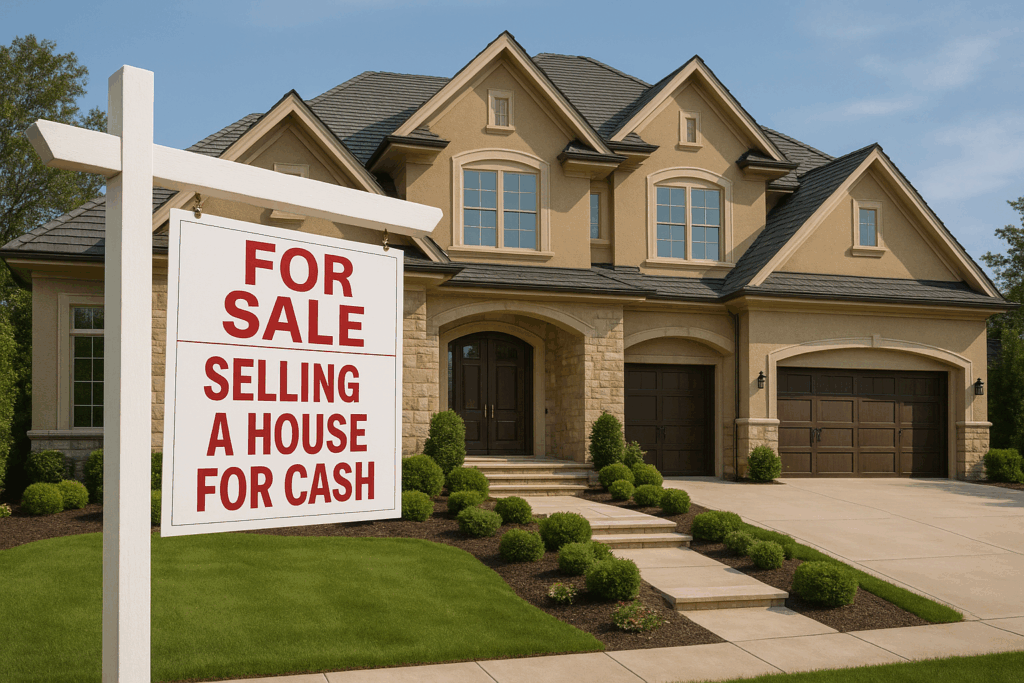Introduction
If you’re searching for “Need to Sell Your Home Fast? Here’s a Timeline for Selling to a Cash Buyer,” you’re likely facing a situation where speed is a top priority. Whether you’re dealing with financial difficulties, a job relocation, or personal issues that require you to move quickly, you don’t have the luxury of waiting months for your home to sell through traditional methods. You want to know how long the process will take and whether selling to a cash buyer can help you meet your deadline.
You may also be wondering:
- How long does it actually take to sell my home to a cash buyer?
- What are the steps involved, and how fast can I close?
- What is the timeline from offer to closing when selling for cash?
- Are there any disadvantages to selling to a cash buyer for speed?
In this blog, we’ll break down the timeline of selling to a cash buyer, step by step, and answer all the questions you have about the process. We’ll also explain the benefits and potential drawbacks of going this route so you can make an informed decision about whether it’s the right choice for you.
Timeline of Selling to a Cash Buyer: What to Expect

When you sell your house to a cash buyer, the process is typically faster than traditional sales. With no mortgage approvals or inspections that could delay the deal, the timeline is much more streamlined. Here’s a general timeline of how a cash sale works, broken down into key steps. The average timeline for selling to a cash buyer is often 7 to 14 days, depending on the specific circumstances and your location.
Step 1: Initial Inquiry and Cash Offer (1-2 Days)
The first step in the process of selling to a cash buyer is to reach out to them with the details of your property. This typically takes one to two days. You’ll provide basic information about your house, such as its condition, size, location, and any other relevant details that could affect its value.
Cash buyers may request pictures or a walk-through of the property, but they usually don’t require an extensive inspection. Unlike a traditional sale, there’s no need for open houses or showings, which can take weeks to coordinate.
Once the initial inquiry is made, cash buyers will evaluate the home’s market value, factoring in its condition and location. Based on this evaluation, they will make you an offer. The cash offer will often be lower than the home’s market value, typically reflecting 10% to 30% less than what you might get on the open market, but you’ll save on repairs, agent fees, and closing costs.
Step 2: Accepting the Offer (1 Day)
Once you receive the cash offer, you’ll have the opportunity to accept or reject it. The advantage of a cash sale is that you have more control over the process, and you can make a decision quickly. On average, this step can take just one day. If you’re in a hurry, it’s possible to negotiate the offer and finalize the terms the same day.
If you’re happy with the cash offer, you’ll sign an agreement with the cash buyer, and the process moves forward smoothly, with no need for inspections or further negotiations.
Step 3: Agreement, Paperwork, and Title Transfer (3-5 Days)
After accepting the offer, the next step is to sign the necessary paperwork. This usually takes about three to five days to complete. During this time, the buyer will initiate the title transfer process, where they ensure the property’s title is clear and that there are no liens or other legal issues associated with the property.
In traditional sales, this step can take longer due to issues with financing and delays in documentation. However, with a cash buyer, this process is much faster because there are no financing approvals or lender delays.
Depending on the state, you might need to hire an attorney for the closing process, but in many cases, the cash buyer will handle all the legalities, saving you time and money.
Step 4: Closing the Deal (7-14 Days)
Once all the paperwork is sorted, the closing process happens swiftly. Typically, this can happen in as little as 7 to 14 days. Unlike traditional sales that can take up to 60 days or more, a cash sale eliminates many of the delays associated with obtaining financing and waiting for appraisals.
At closing, you’ll sign the final paperwork, and the funds will be transferred to you—usually in the form of a cashier’s check or direct bank transfer. With no bank delays or financing issues, you can expect to receive your payment quickly.
One of the major advantages of selling to a cash buyer is the speed of closing. If you’re facing time constraints, such as needing to relocate for a job, avoid foreclosure, or settle personal matters, selling for cash provides an efficient and predictable timeline.
For an in-depth understanding of the closing process when selling to a cash buyer, visit Bankrate’s Closing Process Guide.
Benefits of Selling to a Cash Buyer: Speed, Convenience, and Certainty
One of the primary reasons sellers opt for cash buyers is the speed and convenience. Here’s how selling to a cash buyer offers benefits that traditional sales can’t match:
1. Speed of Sale: Close in Days, Not Months
A traditional home sale can drag on for 30 to 60 days, or even longer. During this time, you’re required to maintain the home in a show-ready condition, attend multiple showings, negotiate with buyers, and deal with inspection reports. On top of that, if the buyer’s financing falls through, the process starts all over again.
By selling to a cash buyer, you skip all these complications. With no financing delays, no need for repairs or showings, and no long waiting period for inspections or approvals, the process is much quicker. This is why many people choose cash buyers when they need to sell quickly.
2. No Repairs, Showings, or Inspections
When selling traditionally, you’ll likely be asked to make repairs to make the home more attractive to potential buyers. Whether it’s fixing a leaky roof, replacing old appliances, or updating outdated features, these repairs can cost $1,000 to $20,000 or more, depending on the condition of your home.
With a cash sale, buyers typically purchase the property as-is, meaning you won’t have to worry about repairs or renovations. You can avoid paying for costly repairs and move forward without the stress of dealing with contractors or showings. This can save you time and money, especially if your home requires major repairs. For more about the costs of repairs and how to save, visit HomeAdvisor’s Cost Guide.
3. Certainty of Closing
Unlike traditional sales, where buyers can back out or financing can fall through at the last minute, cash sales are far more certain. Once a cash buyer makes an offer and you agree to the terms, you don’t have to worry about the deal falling through. This certainty is invaluable for homeowners in urgent situations, such as avoiding foreclosure or needing to relocate quickly.
Potential Drawbacks of Selling to a Cash Buyer
While selling to a cash buyer offers numerous benefits, there are also some downsides to consider. It’s essential to weigh both the pros and cons before deciding if this is the best option for you.
1. Lower Sale Price
The main downside to selling to a cash buyer is that the offer you receive is typically lower than what you would get in a traditional sale. Cash buyers are often looking for a discount in exchange for the convenience, speed, and certainty they provide. On average, you might receive 10% to 30% less than the home’s market value. For example, if your home is worth $250,000, you might receive an offer in the range of $175,000 to $225,000. However, this can be a reasonable trade-off if you need to sell quickly.
2. Smaller Pool of Buyers
When selling for cash, the pool of potential buyers is typically smaller. While cash buyers often include investors, companies, or individuals with liquid capital, there are fewer buyers compared to traditional financing routes. If your home is in a highly desirable area or is in great condition, you might get higher offers from traditional buyers.
3. No Room for Negotiation
Cash offers are often final, with little room for negotiation. If you’re hoping to get the highest possible price for your home, selling to a cash buyer may not provide as much flexibility compared to listing on the open market. Traditional buyers may be willing to negotiate over price, terms, or repairs, whereas cash buyers are usually firm on their offer.
Conclusion: Is Selling to a Cash Buyer the Right Choice for You?
Selling to a cash buyer offers a fast, convenient, and reliable way to sell your home when time is of the essence. The speed of the process—typically closing in 7 to 14 days—can be invaluable, especially if you’re facing urgent personal or financial circumstances. Additionally, the ability to avoid repairs, inspections, and long waiting periods makes the process less stressful.
However, it’s important to be aware of the trade-offs, such as a potentially lower sale price and a smaller pool of buyers. The decision ultimately depends on your priorities: if you need a quick, hassle-free sale, selling to a cash buyer can be a great choice.
At Tampa Fast Home Buyer, we specialize in buying homes for cash and can provide you with a fair, no-obligation offer for your property. If you’re ready to sell fast and avoid the complexities of a traditional sale, contact us today.

